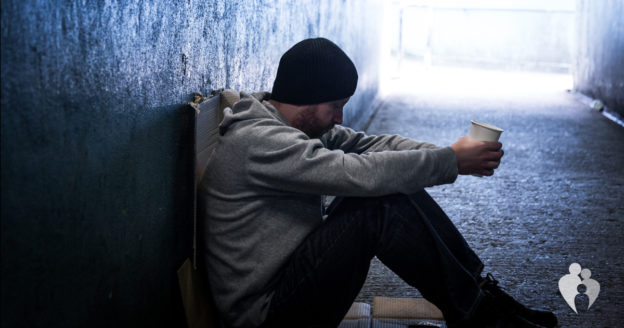Struggling with an alcohol addiction is difficult enough. Being a homeless person with an alcohol use disorder comes with a double stigma that makes it almost impossible to receive assistance. Most people are more comfortable ignoring homeless people with addictions than helping them. Unfortunately, this can lead to many falling through the cracks.
How Are Homelessness And Alcoholism Connected?
It is a common stereotype that every homeless person suffers from a substance addiction. Although this stereotype does have some truth to it, addiction is a disease that requires treatment and support for recovery. It is important for people to establish an understanding of alcoholism, homelessness, and what connects them if they wish to make a difference in people’s lives. Alcoholism is both a cause and effect of homelessness.
Homelessness and alcoholism is a vicious cycle. It can be difficult to determine which problem came first. Some became dependent on alcohol, developed a problem, lost their jobs, and suffered eviction because they could not pay rent. Thus, alcoholism led to homelessness. Others lost their homes first, then turned to drugs and alcohol to cope with life on the streets. Thus, homelessness led to alcoholism. Either way, it can be very hard to break the cycle and resolve both problems.
For a homeless individual to receive the help that he or she needs, a homeless shelter caseworker would have to obtain a housing voucher for the person. This in itself is an uncommon feat. Then, the caseworker would have to find a leasing agent who is willing to rent a home or apartment to a homeless alcoholic. Again, this is very rare. Even if someone accomplished this, the next step would be getting the individual treatment. Some rehab facilities offer their services for free to low-income individuals, but this is not a guarantee. Unfortunately, very limited support options exist to help ex-homeless people adjust to their new homes and lifestyles.
Mental Health And Homelessness
Mental health is a common denominator between homelessness and alcoholism. Many homeless people with substance abuse disorders suffer from mental health disorders. They may have post-traumatic stress disorder, as is common with military veterans. They may also suffer from bipolar disorder, schizophrenia, mania, anxiety, or depression. All of these mental disorders commonly result in substance abuse as a coping mechanism. Similarly, these mental disorders often lead to homelessness.
People who suffer from mental disorders or disabilities often cannot keep their jobs. The stigma surrounding mental disorders means many workers cannot receive insurance or time off to take care of their mental health. Combined with work-related stressors, this could cause an employee to experience a mental breakdown or panic attack. Suddenly, the individual has lost his or her job. This can add to stress and mental instability. If the person cannot get another job, he or she may end up on the streets, unable to pay rent or bills.
A homeless person with a history of a mental disorder is at high risk for developing a substance addiction, even if addiction did not initially cause the homelessness. Losing one’s home, job, and relationships could drive a person to misuse substances. Furthermore, having nothing to lose means no reason to seek treatment. The individual has already lost his or her job, home, friends, and family. Many feel hopeless for the future, and may not see the point in obtaining sobriety. It is often up to third parties to motivate those who are homeless with alcoholism to seek treatment.
Addiction Treatment For The Homeless: What Works Best
For most homeless people, survival is more important than drug or alcohol addiction treatment. Their priorities are to find food and shelter, not addiction counseling. Many homeless people may assume addiction treatment is too expensive, or they may not see the point if they will still be on the streets. As someone who wants to help break the double stigma against homelessness and alcoholism, it is up to you to connect these individuals to a comprehensive support network.
Comprehensive support means tailored treatment specifically for homeless people struggling with alcohol or drug addiction. Centers exist in many cities that provide substance abuse treatment for the homeless. These centers provide access to clean and safe living environments, well-trained and licensed staff, compassionate care, tailored alcoholism treatment plans, and integrated services to address dual diagnoses. Treatment centers can provide the environment, resources, and personnel to address all of an individual’s issues – including both homelessness and alcoholism.
Comprehensive support works best because it addresses the many needs of a homeless person with alcoholism. It takes away the need to focus solely on survival, so the individual can have the freedom and peace of mind to focus on alcoholism recovery. It fulfills his or her social needs, resolving issues relating to isolation, depression, and social stigmas. It provides resources to detox from alcohol and obtain tools to stay sober, such as counseling, therapy, and group meetings. It also connects the person with a support network for finding a job and housing upon release.
Although most homeless people who suffer from alcoholism end up in hospitals, better treatment options exist. Residential and outpatient treatment programs can offer the tailored services the individual needs to address the underlying causes of homelessness and/or alcoholism. A treatment center can provide mental health support, physical assistance, spiritual fulfillment, and more during the patient’s care. A comprehensive and holistic approach to wellness could be the answer to both issues: homelessness and alcoholism.
Help Is Available
Where does one find a comprehensive treatment center for someone who is both homeless and an alcoholic? Start by researching centers in the area. Call around and ask different treatment centers if they offer inpatient programs for homeless individuals. Explain your unique situation and find out if cost-free help is available.









 All Rights Reserved |
All Rights Reserved |